Operating a Church or Religious Organization in Maryland and Handling Disputes
Religious organizations in Maryland, including churches, synagogues, and mosques, are typically structured as “religious corporations,” which is a special category of corporation that has been authorized by the State of Maryland. Certain hierarchical religious denominations, such as the Roman Catholic Church, the United Methodist Church, the United Presbyterian Church, and the Episcopal Church, have their own unique treatment under the Maryland Corporations Code. All other churches, religious societies, or congregations – regardless of sect, order or denomination — are subject to the provisions that I will summarize below.
To form a religious corporation, the adult members of the organization must elect at least four trustees to manage the affairs of the religious organization and prepare a written plan for the governance of the organization. Among other things, this plan document has to set forth the time and manner for the election and succession of trustees, and the qualifications for individuals to be eligible to vote in elections, and to be elected to office in the organization. It must then be acknowledged by a majority of the trustees. Once the written plan is in place, the trustees have to file articles of incorporation with the State of Maryland in order to establish the religious corporation, and the articles of incorporation must contain the written plan of the organization, in addition to other required information.
Once the religious corporation is established with the State of Maryland, the board of trustees manages the worldly functions of the organization, leaving theological matters and pastoral duties to the clergy or to the members themselves. The trustees manage the financial activities and assets of the organization in a similar manner as a for-profit corporation’s board of directors manages a business corporation. It is important to understand that it is the trustees (acting as a board) that own and manage all of the organization’s property and assets – not the clergy. However, unless the written plan provides otherwise, the senior minister of the church also serves as one of the trustees of the religious corporation, in addition to those trustees that were elected by the congregation.
Many of the same types of issues and disputes that confront for-profit corporations can also arise in a religious corporation, but in addition, religious corporations often seek advice in three areas that are somewhat unique to this sphere: (1) disputes over how elections are organized or held within the religious organization, (2) controversies over hiring or dismissing clergy, and (3) members of the congregation wishing to leave and form another church, synagogue, or mosque.
Disputes over congregation elections always have unique facts, but a central issue in such a dispute often is determination of who the members of the organization are that are permitted to cast ballots in an election. Although the statute mandates that the written plan set forth the qualifications for individuals to be eligible to vote in elections and to be elected to office in the organization, many plans are vague on this point. That can lead to uncertainty as to which of two or more rival church membership rosters of eligible voters is correct. The statute requires that, if a contest arises over the voting rights or the fair conduct of an election, those questions must be submitted to arbitration by a panel of three arbitrators, to be selected in accordance with the statute, who are members of neighboring churches of the same religious persuasion. There is no appeal from the decision of this three-arbitrator panel.
Controversies over hiring or dismissing members of the clergy are governed by the written plan of the organization, but as in the case of elections, some written plans lack precision on how this is to be done. Sometimes factions in the congregation are pitted against each other for or against the retention of a particular member of the clergy, and depending on the terms of the plan, this can lead to a decision by the board of trustees, or in some cases to a contested election of the congregation.
When members of a congregation decide to break off and form a new congregation, the act of leaving one congregation is relatively straightforward, but disputes can arise over ownership of real property or financial resources. Although the statute specifically allows members of a congregation to separate and form a new congregation, that does not mean that the splinter group will have any right to take real property or financial resources of the original organization with them.
Our firm can answer questions and provide legal guidance to churches, synagogues, mosques and other religious organizations related to their governance, legal rights and obligations. We also can assist those who wish to form a new religious organization, whether resulting from a division of an existing congregation or as a completely new organization. Please contact us at [email protected] or (410) 489-1996.

Steve Lewicky
Latest Posts
I was placed on a PIP by my employer—Now what do I do?
You’ve just been placed on a Performance Improvement Plan (commonly known as a “PIP”). Take a deep breath. While it may be framed as a supportive tool to...
Maryland’s New Child Support Guidelines
A shift in the way child support is calculated is coming to Maryland on October 1, 2025. Under current law, child support is calculated based only on the...
